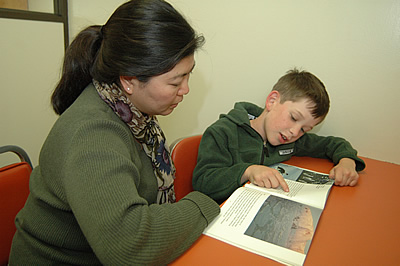|
Reading Center at CSUF Helps
'Reluctant Readers' and Graduate Students |
|||||
|
|||||
| In addition to working with the
children, reading center sponsors family literacy workshops, where
parents learn how to work with their children to advance reading skills.
May 5, 2005 The young girl pursed her lips, scrunched up her face, and concentrated intently on the words before her. Seated beside her, a Cal State Fullerton graduate student offered guidance and encouragement. Twice a week, for 14 weeks, dozens of elementary-school age students arrive on campus for special one-on-one reading sessions through the university's Reading Center, which was established in the 1970s. The center – a warm, brightly lighted environment – is filled with the best literature, both fiction and non-fiction, available to students today. Within its walls, students experience a safe and inviting environment. They know the goal is reading success. The center's mission statement states clearly: Students' success is our success. In addition to working with the children, the center sponsors family literacy workshops, where parents learn how to work with their children to advance reading skills. "The parents and caregivers love it," said Barbara Clark, center director. "We provide essential and effective activities that help strengthen reading both in and out of the classroom. In fact, we have files of ‘fan mail.' It really is a wonderful opportunity for struggling children or young adults having problems with reading. There is a great appreciation for the accomplishments of our program. It has made a difference in the lives of others." Children who are accepted into the program are usually one-and-a-half to two years behind in their reading. However, the Reading Center program is not a quick fix. Most students spend anywhere from one to two years perfecting their reading skills. Renee Soderquist of Fullerton is amazed at the progress her 8-year-old son, Dallas, has made since entering the program. "He simply could not read or follow directions," his mother said. "Now he's reading 60-page chapter books and actually likes to read. He even entered an essay contest at his school. Because of his lack of reading skills, he was struggling with virtually every subject in school, and now he's excelling. He has much more confidence, and it's been wonderful to see him succeed and feel good about himself." Scott Cardwell of Yorba Linda voiced similar thoughts about his fourth-grade daughter, Rachel. "After a few semesters, she's now reading at grade level and really seems to enjoy reading for the first time," he said. "She's finding school much easier, and she's enjoying it much more. Before, she was often frustrated. I don't see that now. Her teachers are thrilled with her progress." "Success in reading builds confidence," said Clark. "It's so critical. Once these students learn to read, it opens up whole new worlds for them. Not only do they experience success in school, but often for the first time, they develop a sense of self-confidence as well. They're more willing and eager to try new things. Since they've overcome one significant hurdle, they're more willing to try to learn other skills." An important component of the Reading Center is that practicing teachers – in the last semester of the graduate degree program in reading – work with students who are experiencing significant reading difficulties. The program provides immense benefits for all involved, noted Clark. Students receive intensive tutoring in reading – a skill essential to academic success. Graduate students receive the opportunity to refine their teaching skills, utilizing research-supported skills and strategies they have gained at the university. Parents pay only $125 per semester for their children to take part in the program. During this time, tutors meet with students twice a week. "The key to our success is that we break reading down into incremental steps," said Clark. "With some students, a book may be too much, so we use games or flash cards. Once they've mastered necessary skills, we move on to books and gradually increase the difficulty. The students are learning to read much more easily and, as they succeed here, they become more excited about reading for pleasure and in school. "For teachers, that's one of the most wonderful benefits – knowing that the world of reading has been opened to a youngster." Although most of the "clients" are children, the center also has provided services to adults with referrals from local businesses and employers, as well as postsecondary students at Cal State Fullerton. Because of the significant demand for the center (there is an extensive waiting list for its services), the university hopes to expand the facility on campus and open another on the El Toro Campus. The El Toro center will have an expanded focus and will be called the Community Learning, Research and Resource Center. |
|
